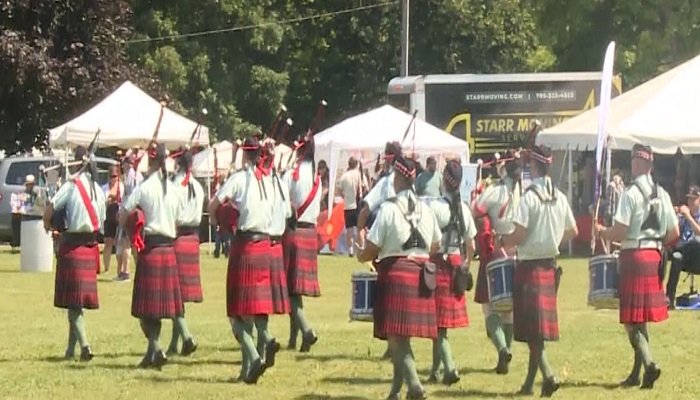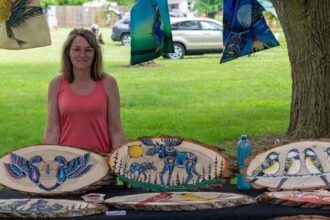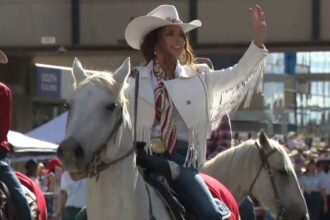The skirl of bagpipes cut through the summer air as thousands gathered this weekend at Churchill Park for the Cambridge Scottish Festival. What began as a modest celebration has evolved into one of Ontario’s premier cultural gatherings, offering a vivid reminder of how deeply Scottish traditions are woven into Canada’s cultural fabric.
As I wandered among the crowd, many proudly sporting clan tartans that have remained unchanged for centuries, it became clear this wasn’t merely a festival but a living museum of heritage. Families of Scottish descent mingled with curious newcomers, all drawn to the rhythmic pull of Celtic music and the impressive display of athletic prowess.
“This is about keeping traditions alive,” explained Angus MacPherson, whose family has participated in highland games for four generations. “When my great-grandfather came to Canada in 1904, these gatherings were how Scottish immigrants maintained their identity in a new land.”
The heavy events competition proved particularly captivating, with competitors in traditional kilts hurling massive stones and tossing cabers (telephone pole-sized logs) with remarkable precision. These tests of strength have roots stretching back to Scotland’s medieval clan gatherings, when such feats determined the most capable warriors. Today, they serve as spectacular reminders of how cultural traditions adapt to new contexts while maintaining their essential character.
What makes the Cambridge festival particularly noteworthy is its approach to cultural preservation. Rather than freezing Scottish heritage in amber, organizers have embraced a dynamic interpretation that acknowledges both tradition and evolution. Children’s activities introduced youngsters to Scottish folklore through contemporary storytelling techniques, while food vendors offered both traditional fare and fusion dishes that blend Scottish ingredients with diverse culinary influences.
The bagpipe competitions revealed another fascinating dimension of cultural transmission. Competitors included not only those with Scottish ancestry but also enthusiasts from diverse backgrounds who have embraced this challenging instrument. The championship pipe bands demonstrated extraordinary precision, with dozens of pipers producing a harmonized sound that resonated physically through the crowd.
Cultural anthropologists have long noted how immigrant communities maintain connections to their heritage through such gatherings. In our increasingly digital world, these tactile, immersive experiences provide something that online interactions cannot replicate – a sense of physical continuity with the past. As one attendee remarked, “You can watch videos of highland dancing online, but feeling the ground vibrate beneath your feet as dancers perform is completely different.”
The festival also serves as a reminder of Scotland’s outsized influence on Canadian institutions. Our parliamentary system, legal frameworks, and educational models all bear Scottish fingerprints – a legacy of the disproportionate role Scottish immigrants played in Canada’s early development. This influence extends to our cultural landscape as well, with Scottish traditions integrated into many communities regardless of their demographic makeup.
While attendance numbers continue to grow each year, organizers face the universal challenge of cultural festivals: balancing authenticity with accessibility. How does one preserve meaningful traditions while welcoming those without prior knowledge? The Cambridge Scottish Festival appears to have found a successful formula, creating entry points for newcomers while maintaining enough depth to satisfy those deeply versed in Scottish culture.
As twilight descended and the massed pipe bands gathered for their final performance, the emotional impact was undeniable. There’s something primally moving about dozens of bagpipes and drums playing in unison – a reminder that certain cultural expressions transcend intellectual appreciation and tap into something more visceral.
In an era of increasing virtual connectivity, the sustained popularity of the Cambridge Scottish Festival suggests we still crave tangible connections to heritage and community. Whether through sports competitions, musical traditions, or simply gathering to celebrate shared history, these festivals provide something increasingly precious – authentic human connection rooted in cultural context.
For those who missed this year’s celebration, planning is already underway for the 2025 event, promising an even more comprehensive exploration of Scottish heritage and its continuing influence on Canadian cultural identity.
As one festival-goer told me while adjusting his kilt before the caber toss: “These traditions have survived for centuries because they speak to something essential in us. They’ll be here long after we’re gone.” In an age of ephemeral trends and disposable culture, such continuity offers a grounding perspective worth celebrating.























